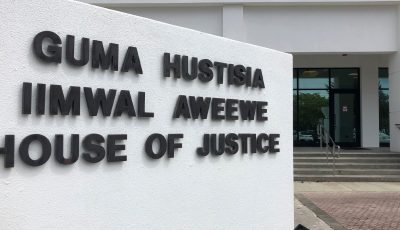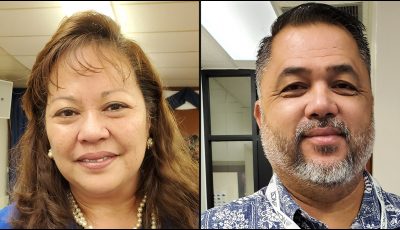Convicted child molester Calvo out of prison by May
Defendant gets 7 years in prison, but can avail anytime DOC’s work release program
Convicted child molester Patrick M. Calvo will be released from the Department of Corrections on May 25, 2017, but anytime starting today he can possibly avail of DOC’s work release program.
At yesterday’s resentencing, Superior Court Presiding Judge Robert C. Naraja imposed a total of seven years imprisonment on the 54-year-old Calvo for sexually abusing a 13-year-old girl in 2008.
Naraja said after completing the prison term, Calvo will be placed on probation for seven years.
Naraja required the defendant to, among other things, seek clinical psychiatric evaluation treatment, register as a sex offender, perform 1,500 hours of community work service, and submit to HIV testing.
Calvo was also ordered to pay restitution to the victim, pay a $1,000 fine, $100 in court assessment fee, and $700 in probation fee.
Naraja said following the victim’s family’s request, the defendant is not allowed to have direct or indirect contact with the victim during the probationary period.
The judge said Calvo is restricted from employment involving contact with minors or those under 18 years old.
In an interview after the hearing, Francisco Ada, on behalf of the victim and her family, said the truth is Calvo has yet to acknowledge that he did commit these crimes.
Ada said he is not going to comment on the legalities about the resentencing, but that all he knows is that eight years of imprisonment is not enough and Calvo is going out of jail in May next year or before eight years.
Eight years imprisonment was the original sentence that Naraja imposed in May 2010.
Ada pointed out that Calvo may even be allowed to be released on DOC’s work release program starting today, Thursday.
He is hoping that DOC will not allow the defendant to be on work release.
Ada said his nieces were born and raised on Saipan and that they love to come back to their island, see their family, their grandmother here.
Ada said it’s very hard for them to return knowing that Calvo will be released before his eight years is up.
Ada said even for the offenses that Calvo committed, still to this day, he has yet to admit.
“Eight years is not enough, is not justice,” he said, adding that Calvo robbed “them” of their innocence.
In 2000, the Office of the Attorney General filed two criminal cases against Calvo for allegedly sexually abusing two minor girls in 1997 and 1998.
One jury acquitted him. In 2005, the court dismissed the second case after the government moved to drop the charges.
Ada said in this 2008 case, a lot of issues here in the community were raised with regards to appropriate treatment “whatever it is.”
Ada said people that have committed this type of offenses should not seek loopholes in the law so they can be released early.
“I just think that it is really sad for the victims and also how it affects a family and other families, even his (Calvo) own family,” Ada said.
Assistant attorney general Shannon Foley, counsel for the government, refused to comment about the sentence.
Defense counsel Bruce Berline, in an interview, said as he stated the question is about whether the release of Calvo is proper and within the time and the parameters of the sentencing handed down.
“This is the appropriate time. I think the government’s own evidence indicated that this is the appropriate time,” Berline said.
Berline said certain type of therapy needed and approved is available on Saipan and this is the time to do that.
“You can’t just warehouse these people. You’re just putting off a problem that’s gonna surface down the road,” he said, referring to persons convicted of sexual abuse of minors.
He said the government needs to address this problem and they need to come up with adequate services, adequate mental health services for the community.
“This is going to be an ongoing problem,” Berline pointed out.
As to the question that Calvo until now is not admitting guilt, Berline refused to comment.
On Calvo possibly going out on work release, Berline said they are going to try that.
In September 2009, a Superior Court jury found Calvo guilty.
On May 27, 2010, Naraja sentenced Calvo to eight years in prison for sexual assault in the second degree, eight years in jail for sexual abuse of a minor in the second degree, five years in prison for sexual abuse of a minor in the third degree, and six months in prison for disturbing the peace.
Naraja merged the sentences for the first three charges and ordered that the sentence for the last charge is concurrent with the first three other charges. It means that Calvo should serve a total of eight years in prison for all charges. Naraja also imposed many conditions.
Calvo then appealed, asking the CNMI Supreme Court that to reverse his conviction and set a new trial.
In July 2014, the high court upheld Calvo’s conviction. The justices, however, ordered the Superior Court to redo the sentencing because it imposed probation, restitution, and community service without suspending some of Calvo’s jail term.
In May 2014, the CNMI Board of Parole denied Calvo’s application for parole. Those who opposed Calvo’s parole application described him as a monster, a serial sex offender, a pedophile, and good in manipulating persons.
But then-DOC officials described Calvo as a great asset as he worked on the opening of a library and other programs.
Last April, Calvo, through counsel Berline, filed a petition for a writ of habeas corpus against then-DOC acting commissioner Georgia M. Cabrera before the U.S. District Court for the NMI.
Habeas corpus refers to a court order to a prison warden or an institution holding someone in custody to deliver the imprisoned individual to the court.
In Calvo’s petition for habeas corpus, Berline said the Commonwealth’s integration into the U.S. political and judicial system, clearly establish that the Sixth Amendment jury trial right is a fundamental constitutional right in the Commonwealth.
Berline said denying Calvo of this right was contrary to or unreasonable application of the Sixth Amendment jurisprudence.
Calvo used to be president of the Rotary Club of Saipan.



























